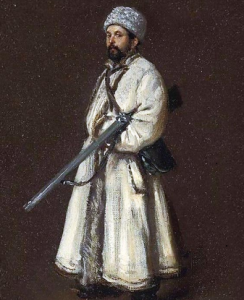Synopsis:
The Huntsman is a sad story about a painful yet absurd interaction of a couple in the rural forest.
One hot day outside the village, the handsome blond hunter Yegor Vlasych, who is a “tall, narrow-shouldered man of about forty” encounters Pelagaya, a “pale-faced woman of about thirty” who acts shy around him. They have not seen each other in a long time and act like aquiantances. Pelagaya is timid yet persistent in talking with Yegor and admits she has been looking out for him and waiting to see him again, despite the beating he gave her at their last encounter. She is overjoyed to see him now and implores him to come back to the village with her. He refuses because it will impinge on his freedom and declares, “once a free spirit settles in a man, there’s no getting it out of him”.
Finally, Pelagaya reminds him that they have been married for twelve years. Through their dialogue the reader learns that Yegor’s rival Count Sergei Pavlych made him drunk for a month and then married him to Pelagaya in church despite his lack of Christian faith. Pelagaya references another woman for whom Yegor has helped build a cottage and persists in asking him to come to the village, to which Yegor declares that he will never come to the village sober and concedes its probably better for her because he “gets angry when [he’s] drunk”. This is perhaps in reference to their last meeting. Yegor’s only gesture of care is the ruble he presses into Pelagaya’s limp hand before he walks away into the forest. She watches him until he disappears, whispering tragic goodbyes under her breath.

There is a drastic gender inequality in this story. Clearly, the couple is mismatched. He is of the woods and forest, she of the fields and the farm. This contrast harkens back to traditional hunter gatherer societies. Yet, the lack of respect he shows her is astonishing, and the casual references to physical violence are unacceptable in contemporary society. There are hints of the age old trope of the dutiful wife waiting for her husband, but Chekhov manages to make this encounter seem more fresh and unpredictable
In “The Huntsman”, Chekhov masterfully captures the erraticism of human emotion. In a seemingly random, capricious display of such emotion, Yegor Vlasych treats Pelageya with audacity, insolence, indifference, aversion, spite, and maybe even the trappings of genuine love (all this, I should add, in the span of about 5 pages). In lieu of a denouement, Yegor mysteriously walks off and evaporates in the distance–as if he were fading forever into Pelageya’s memory–leaving the encounter painfully unresolved (for the characters and the reader) in classic Chekhovian fashion.
This story reminds me of my favorite of Nabokov’s generalizations in his “Lectures on Russian Literature”: “[Chekhov’s] story does not really end, for as long as people are alive, there is no possible and definite conclusion to their troubles or hopes or dreams”.
I cannot speak to the intricacies of the translation, but I found the name “Pelageya” curious. On one hand, it recalls the French “pelage” (meaning “fur”), and on the other the Latin “pelagia” (meaning “of the sea”). Both are interesting given her relationship to the hunter and situation in a “sea of ripe rye” (9)
The name Pelageya shows up in a few other Chekhov stories, notably the ones comprising “The Little Trilogy”.
The story begins: “A sultry and stifling day. Not a cloud in the sky… The sun-scorched grass looks bleak, hopeless: there may be rain, but it will never be green again…” (9). Perhaps Shestov was right in calling Chekhov the “poet of hopelessness”!?
In this article from 1983, Howard Moss praises Chekhov and examines his early stories and evolution of writing. He focuses on Chekhov’s talent in the Huntsman to suggest that the protagonist lives by a set of values which we as the reader is not even aware of, thus we become uneasy.
http://www.nybooks.com/articles/archives/1983/dec/08/the-miracle-of-chekhov/
Independent film adaptation of The Huntsman shot in a traditional Russian style but performed in English and filmed in New Orleans:
https://www.youtube.com/watch?v=DVzIf8L-RTc